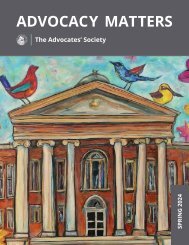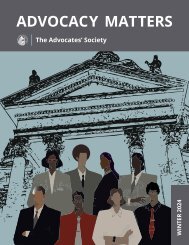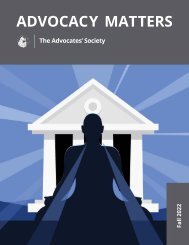Advocacy-Matters-Summer-2023
Keep up to date on what your fellow Society members have to say in Advocacy Matters.
Keep up to date on what your fellow Society members have to say in Advocacy Matters.
Create successful ePaper yourself
Turn your PDF publications into a flip-book with our unique Google optimized e-Paper software.
with relevant stakeholders, including the courts, professional regulators, and the public, to grapple with<br />
the issues it presents. We will need to consider and contain the risks, but should not lose the opportunity<br />
to benefit from the efficiencies in practice and in the administration of the court system that AI could<br />
offer. Our policy work and educational programs will be infused with technology issues.<br />
Finally, a focus on the future means paving a path for a properly-functioning justice system. Through<br />
our policy work, the Society will continue to work on access to justice issues and on improving the system<br />
for future advocates’ and litigants. One priority will be to work on the pervasive issue of civil delay<br />
following our call to governments, the courts, the bar, and all stakeholders in the justice system to take<br />
immediate and concerted action to solve the problem of delay in the civil and family justice system<br />
(“Delay No Longer. The Time to Act Is Now”).<br />
Q. What role do you see MASC members playing in the work of the society?<br />
A. MASC members play a crucial role in the Society’s work. This year, MASC will be developing and<br />
launching an important new education and collegiality event for the MASC demographic—Winter Summit:<br />
The Big Chill Ottawa. MASC members will, as usual, be serving on several of the Society’s working<br />
committees, where you have made some of the most meaningful contributions to our policy work, to<br />
expanding our membership, and to our education programs. MASC members are really on the front<br />
line in many ways. You provide critical skills and knowledge. You have expertise in and a facility with<br />
technology used in litigation that some of our more senior demographics may not. You have had<br />
greater exposure to and developed greater expertise in issues of EDI. You are hitting your stride in<br />
practice and first-chairing litigation. You are transitioning into senior members of the profession and<br />
building profile. You are stepping into leadership roles. Many of you have started your own firms. You<br />
are developing business. Many of you have family obligations—children or aging parents or both. It is<br />
the most demanding time of your career, and the MASC perspectives and voices are essential for the<br />
Society to have a clear view of current issues and needs, and the future of the profession.<br />
am incredibly proud to be associated with this organization.<br />
For its members, I would like the Society, with its focus on best-in-class advocacy skills training,<br />
policy work, and opportunities for collegiality, to be an essential part of every Canadian advocate’s<br />
professional trajectory. For the profession in general, I would like for the Society to maintain a stellar<br />
reputation for excellence in each of these areas and to serve as the respected voice of advocates in<br />
Canada on important issues affecting our justice system.<br />
Q. What are your thoughts on the future of the profession?<br />
A. I see a snapshot of our future in our MASC and YASC membership, so I am very optimistic! But we<br />
cannot take what we have for granted. The profession will need to remain committed to continuously<br />
improving our justice system, defending judicial independence, upholding the rule of law, and respecting<br />
and protecting our rights and freedoms. If we can deliver on that commitment, the future will be<br />
bright. I also see evolving technology, deployed thoughtfully and appropriately, as an aid and not a<br />
threat to advocates.Technology will not replace effective oral advocacy, persuasiveness, judgment, ethics,<br />
or human connection.<br />
Q. What does the advocates society mean to you? What do you want it to mean for TAS<br />
members and the profession generally?<br />
A. When I first joined, the Society was instrumental in connecting me to a community of litigators outside<br />
of my firm, as I was practising in New York during the years in which people tend to develop their<br />
local networks. I found opportunities through teaching litigation skills and participating in education<br />
programs.<br />
My involvement has steadily increased over my 17 years of membership, so I now have a far better<br />
understanding of everything the Society does. It was not initially clear to me that I was the type of member<br />
the Society had in mind. I now know that the Society is for all advocates, at every career stage, who<br />
are committed to the practice, focused on achieving excellence in advocacy, interested in protecting<br />
and improving our justice system, and who want to be part of an inclusive and collegial community. I<br />
18 19

















